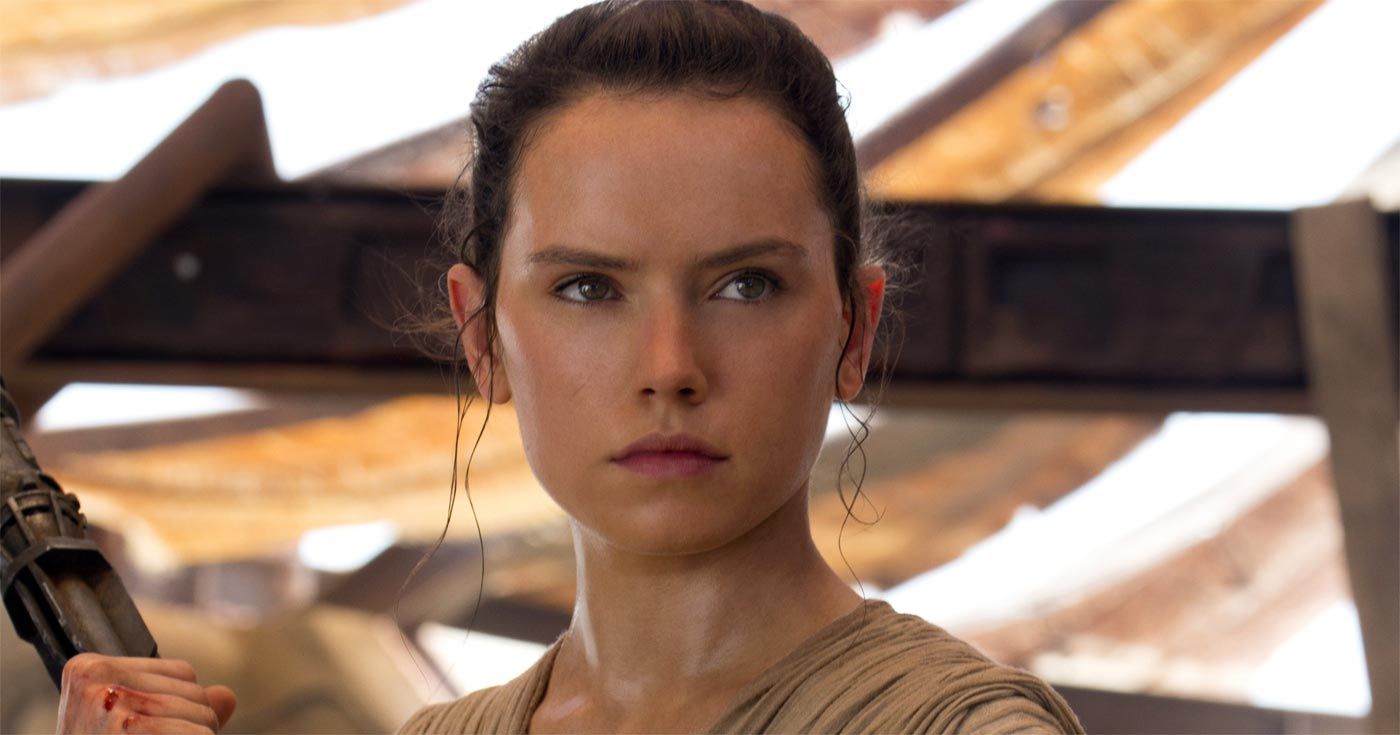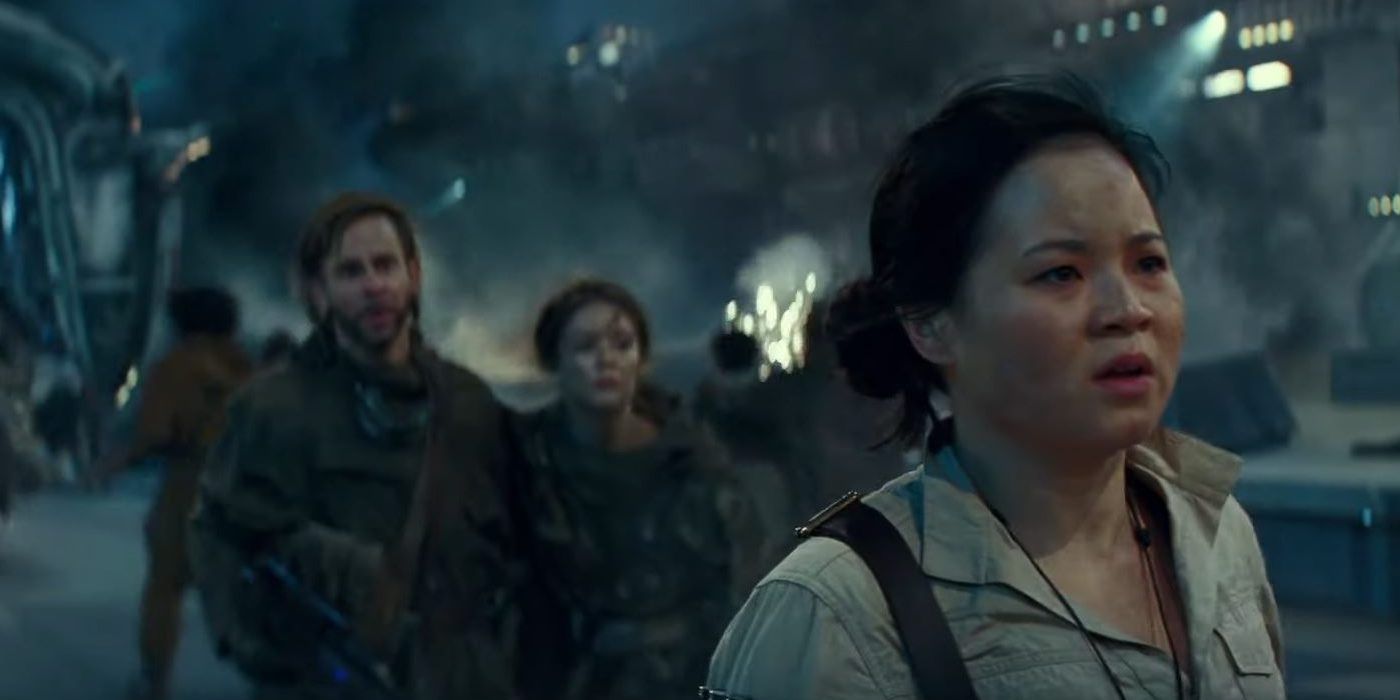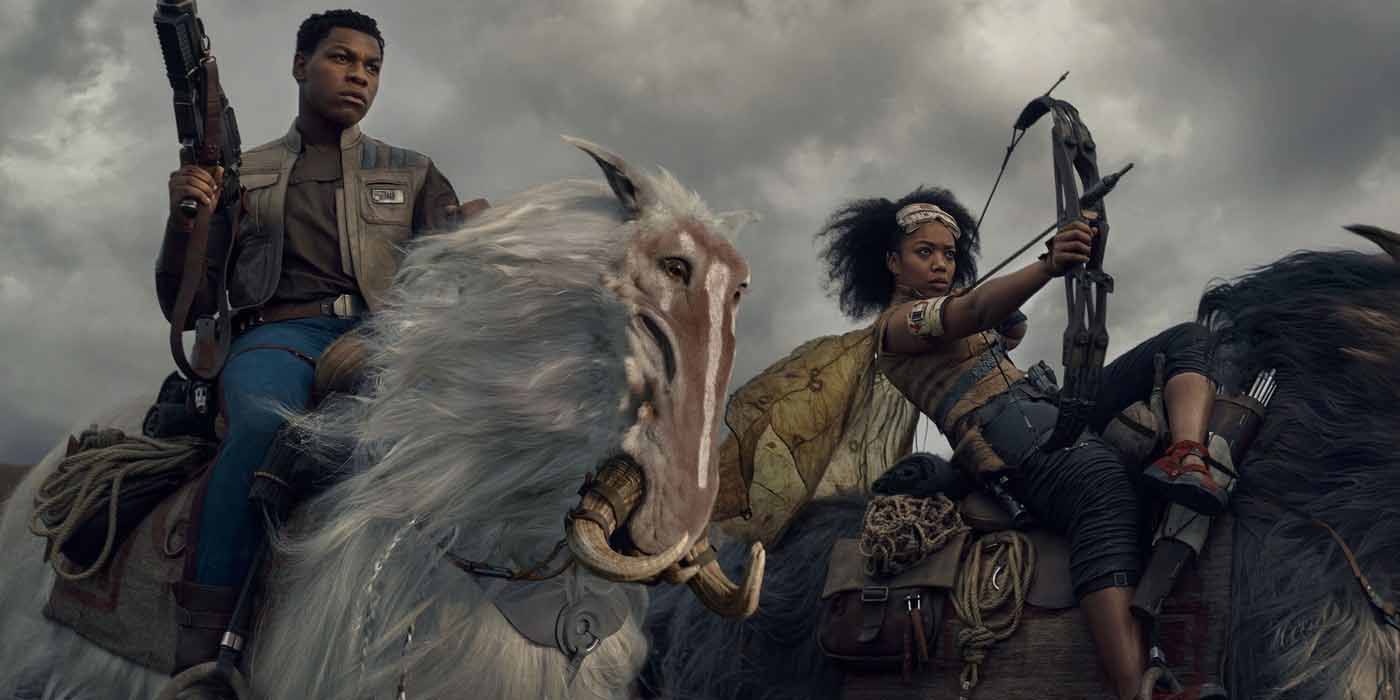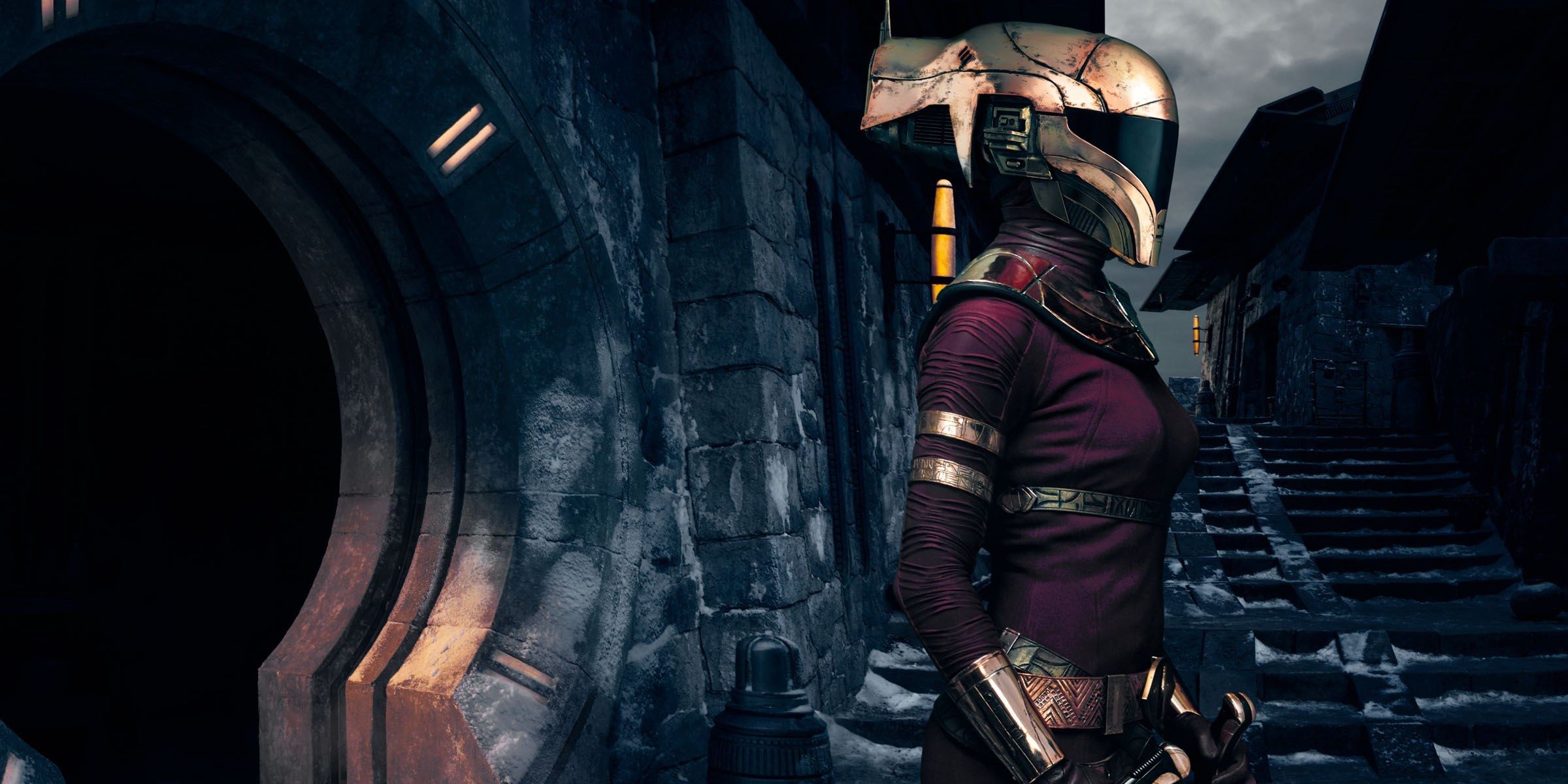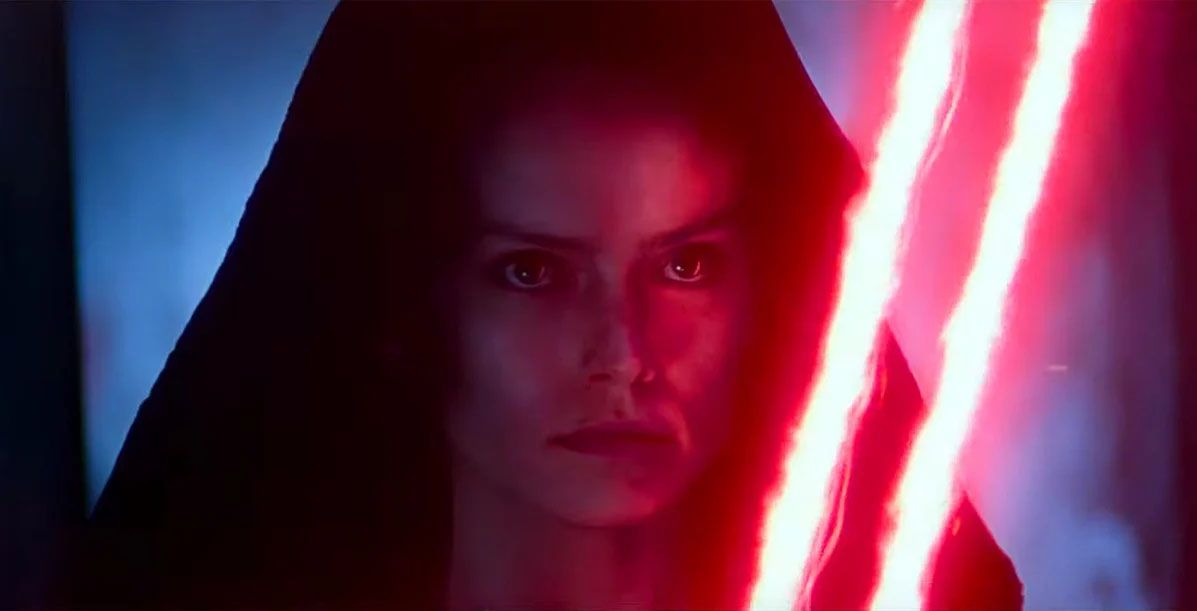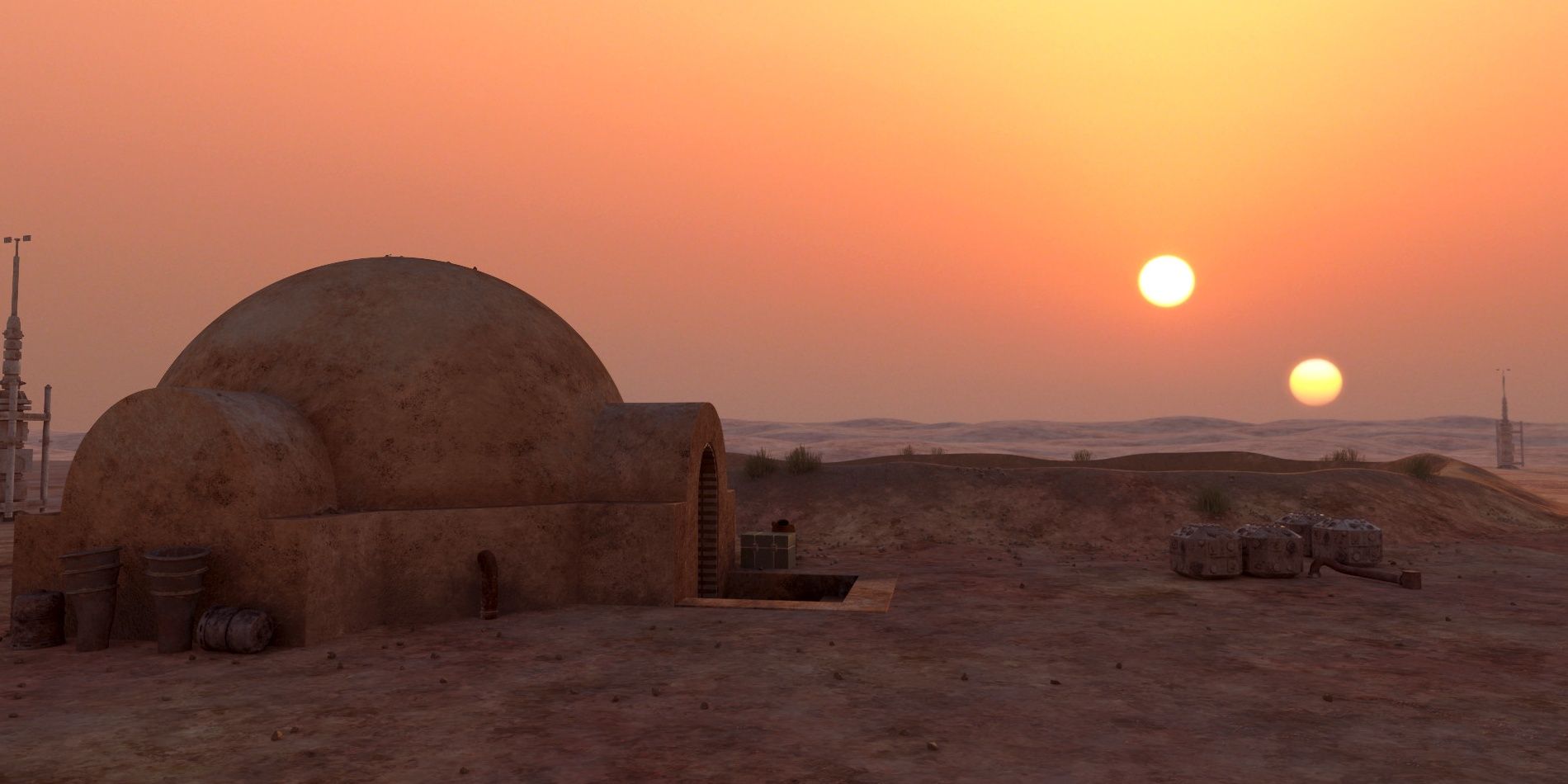WARNING: The following contains spoilers for Star Wars: The Rise of Skywalker, in theaters now.
Besides Reylo, one of the great marketing tools of the Star Wars sequel trilogy was its emphasis on girl power, as well its subversion of class dynamics. The films showed that women -- even poor, destitute women with no connections to powerful men -- could play the same role in the franchise as every cocky flyboy or adopted son of a moisture farmer. Unfortunately, and despite the press tour assurances from the cast and crew that Rey and her gal pals are here to lead a new generation of fans into the new world of gender equality, The Rise of Skywalker makes sure that none of the women of the franchise gets to live happily ever after nor establish any lasting romantic connection.
Instead, Episode IX leans heavily into the tired trope of the "strong female character" that has to resign from silly notions like love and family to live up to her full potential. Adding insult to injury, the film removes all agency from the women, and instead thrusts them onto a straight-and-narrow path of contrived choices foisted upon them by male characters or by the Force -- which, in J.J. Abrams' movie, acts not as the power that propels life in the universe, but like the mean Catherine de Bourgh of Pride and Prejudice.
Let's start with Leia Organa, whose call for help in The Last Jedi was ignored by the entire galaxy. However, Lando Calrissian, who has been hanging around on Pasaana doing who knows what, just has to say the word for an entire legacy fleet to appear out of nowhere. Then there's the handling of her Jedi training, which she gave up because she felt the Force might corrupt her unborn son -- a narrative choice that comes out of left field but that mirrors the real-world dilemma of women giving up promotions for fear that their careers might get in the way of parenting.
But we could argue that Leia's arc in Episode IX is clunky because Abrams had limited footage of the late Carrie Fisher. But what about the characters portrayed by living actresses?
There's Rose Tico, played by Kelly Marie Tran, who had a major role in The Last Jedi with an interesting arc of her own. Unfortunately, a vocal segment of Star Wars fans loathed the character and harassed the actress until she left social media. Things looked brighter when Abrams announced Tran would rejoin the cast in The Rise of Skywalker and that her role would be even better. She was billed as a general, an essential part of the Resistance; Tran went on a press tour and talked about the great feminine energy of the set. The comes The Rise of Skywalker, where Rose appears three times, speaks four lines, and is sidelined to the "really important job" of tech support, with her connection with Finn never addressed. In The Rise of Skywalker, Rose doesn't get romance, connections, friendship, a job, or a story of her own -- something that should please the most toxic fans.
RELATED: The Mandalorian May Hint At the Dreaded Return of Midi-Chlorians
Then there's Jannah, played by Naomi Ackie, another "strong female character." The twist this time is that, like Finn, she's a former Stormtrooper who mutinied and defied an order to kill a bunch of villagers. For a few seconds, her story is hopeful and fascinating, and teases the line from the trailer that "good people will fight if we lead them," that free will and the power of the individual are concepts that exist in Abrams' Star Wars.
How foolish of the audience to hold such hope. Jannah and Finn explain they weren't the ones who decided to spare the innocent villagers; it was a feeling. The Force takes care of silly dramatic concepts like agency, choice and heroism. Jannah is not a good person because of her actions, but because the Force willed her to be one. The only funny thing about this depressing predeterministic twist is that it also works as an apt metaphor for the actions of the characters in The Rise of Skywalker, who do things not because they make sense, but because the script -- the Force -- says so. To add another nail to the coffin, The Rise of Skywalker Visual Dictionary hints at Lando being Jannah's father, yet another woman of Star Wars whose story doesn't matter unless she's related to a legacy male character.
Moving on, Keri Russell plays Zorii Bliss, a spice runner from Kijimi who essentially wears Leia's slave outfit, only with thermal underwear. Zorii's only purpose in the story is to provide a tragic background for Poe Dameron, as well as a potential love interest. She's also a glorified MacGuffin holder (twice!), and one of the many characters that Abrams fake-kills to ignite an emotional response from the viewer in a desperate effort to make Poe sympathetic. Zorii's role could have easily been filled by Rose, who was an actual tech whiz with a questionable past and a potential massive beef against Poe. After all, he's directly responsible for her sister's death.
Let's move on to Rey (Daisy Ridley), who is retconned from being a resilient orphan scavenger strong in the Force... to receiving her powers from a male bloodline. Now, to be perfectly clear, there's nothing wrong with overly dramatic space operas where everyone is related to a royal family, but this "reveal" goes against the premise of The Force Awakens and the heart of The Last Jedi, which proposes that anyone can be a hero.
There were no hints at all about this "twist" -- not in the movies, in the animated series or in the ancillary material, which makes it feel like a last-minute decision designed to appease those fans who accused Rey of being an overpowered Mary Sue, overlooking one of the most common Mary Sue tropes: their tendency to be secretly related to important canon characters.
Another Mary Sue trope exploited in The Rise of Skywalker, but that wasn't even touched in the previous two movies, is the female character sacrificing herself for the greater good, only to be saved at the last minute by a man, which is exactly what happens here. This double-whammy of "being powerful because of grandad" and "getting to live because of a man" is particularly egregious, and caters to no one, because of what happens right after Ben Solo sacrifices himself. We'll get to that in a moment.
Then there's the Force vision scene. Rey already had a trippy Force vision in The Last Jedi, a deep dive into an array of feminine symbology that she wasn't afraid to confront, from which she emerged heartbroken but stronger. In The Rise of Skywalker, this moment is undercut and shows Rey terrified of the darker, sexier, powerful version of herself, which is a hard pill to swallow. Rey explicitly says that she has nightmare visions where she and Kylo Ren are the evil Empress and Emperor of the Galaxy, linking the fulfillment of her desires to the galaxy's apocalypse. In Episode IX, romantic love is a flaw that the "strong female character" should overcome, but sex is pure evil.
Her visceral rejection of her dark side is also a 180 turn on her chill acceptance of her darkness in The Last Jedi. In the real world, women are taught from a young age to hide their negative feelings, to smile and live to be pleasant to everyone, to not be loud or angry or intense. That mentality only makes things easier for everyone in the world who is not a woman, and runs contrary to the quickly angered but enthusiastic scavenger of the previous two movies. However, by the end of The Rise of Skywalker, Rey has transformed into this Cool Girl version of Ideal Femininity/Strong Woman Character.
Ben Solo's death right after his redemption and first kiss should have been treated like a tragedy at least by Rey, and at least for one minute... but she does not react at all. The camera cuts from Ben's clothes folding as he disappears to Rey's neutral expression as she flies back to the Resistance. His death, and any emotional reaction that it might have caused in the protagonist, is not mentioned at all, which is baffling, to say the least. After a brief reunion with Finn and Poe, Rey immediately regresses on-screen to a lonely child on a desert planet, sliding down a Tatooine sand dune and negating her evolution for the last two movies, just so Abrams could throw in a homage to himself.
For the sake of argument, let's take Rey's reveal of her villainous ancestry at face value, and let's imagine that Disney had prepared this reveal from The Force Awakens: Her ending is still insulting, because it forces her to pay for the actions of her grandfather, despite having suffered as much as anyone from his evil ways. Palpatine's murderous pursuit of his son's family was what caused Rey to grow up heartbroken and abandoned on Jakku.
Rey longed for family and love her entire life; she jumped at the opportunity to establish a real connection with Han Solo, Maz Kanata, Finn, Leia, Luke and Kylo Ren, and in The Rise of Skywalker she looks longingly at the Pasaana children, clearly wanting a family of her own. Rey marveled at the green of Takodana in The Force Awakens and at the water of Ahch-To in The Last Jedi. Just like Anakin, she hated the desert. So why does the plot force her to go back to Tatooine to take on the Skywalker name, a planet where none of the Skywalkers, Organas or Solos were born; that Anakin and Luke longed to escape; where Shmi Skywalker was enslaved twice and then killed; and where Leia became Jabba's sex doll? Wouldn't it make more sense for her to head to verdant, watery Naboo, where both Palpatine and Padmé came from, the place where the latter wanted to raise her Skywalker twins?
But, no, Rey doesn't get to live where she would be logically happier, or where it makes sense; she goes where the fan service is stronger, and the twin suns of Tatooine were unparalleled -- until now. When an old woman asks Rey her family name, she answers "Skywalker," which doesn't hold up to close examination. Luke Skywalker refused to train her, Leia's name was Organa, Ben and Han were Solos, and she's standing on the Lars' buried homestead. And although it makes sense that she would lie about her true ancestry, denying the Palpatine name still reeks of burying her darker side, which worked really well for the Jedi Order.
Compare this ending of a lonely girl on a barren planet lying to strangers about her family name to the ending of The Return of the Jedi, where Luke, Han, and Leia are surrounded by life and celebration, and everyone is radiant with love and living family. Or compare it to the ending of The Last Jedi, where a Force-sensitive boy is looking up at shooting star. Or even the final scene of Revenge of the Sith, which takes place in the same spot after the fall of the Republic, the death of Padmé and the rise of Darth Vader -- but at least in that little spot there's love, family, life and hope.
Directed and co-written by J.J. Abrams, Star Wars: The Rise of Skywalker stars Daisy Ridley, Adam Driver, John Boyega, Oscar Isaac, Lupita Nyong’o, Domhnall Gleeson, Kelly Marie Tran, Joonas Suotamo, Billie Lourd, Keri Russell, Anthony Daniels, Mark Hamill, Billy Dee Williams, and Carrie Fisher, with Naomi Ackie and Richard E. Grant.

